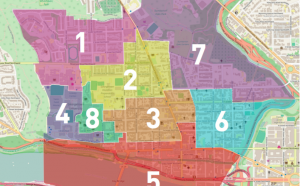Georgetown students will have the opportunity to turn out for their Advisory Neighborhood Commission student representatives on Nov. 4—Kendyl Clausen (SFS ’16) and Reed Howard (SFS ’17) are running for the two student commissioner positions on the ANC 2E advisory board.
Clausen and Howard began their campaigns this week by going to dorms to speak with students and tabling in Red Square. “One of the reasons we’re still running a campaign even though Reed and I are running unopposed is to get the word out about ANC and show that it is an important political body,” Clausen said. “Even though Georgetown students are really political-minded, most of them don’t even know what the ANC does.”
According to their website, “The Advisory Neighborhood Commissions consider a wide range of policies and programs affecting their neighborhoods, including traffic, parking, recreation, street improvements, liquor licenses, zoning, economic development, police protection, sanitation and trash collection, and the District’s annual budget.”
Clausen and Howard are running for the two student seats on the ANC 2E advisory board, which includes a total of eight commissioners. “The students who serve in the ANC are considered elected officials,” Assistant Director of Community Engagement Jamie Scott said. “They have all the same responsibilities as other commissioners, except that they represent a community that is predominantly students.”
Though unchallenged, Clausen and Howard will not be officially listed on the ballot and therefore must be written in by voters. “You need twenty-five signatures to get on the ballot, but you also need to be living in your district sixty days prior to the filing deadline and I lived in Darnall last year and moved to Henle this year, which is in a different district,” Howard said. “Kendyl did not get the required number of signatures. I didn’t meet the residency requirement.”
According to Clausen, getting students involved is imperative for improving Georgetown’s relationship with its neighbors. “I see an amazing group of people on campus who are intellectual and I love going to school with, but the problem is the neighbors only see the people on the weekends who are potentially destroying their property,” Clausen said.
Both Clausen and Howard highlighted the importance of building good relations between neighbors and students, as it will affect negotiations for the next campus plan. “It’s important to me because the next campus plan will be designing Georgetown for the next twenty years,” Howard said, “Its implementation won’t begin until 2018, but we will be the student commissioners during the design phase.”
According to Howard, the design phase will begin soon. The big points of discussion for this campus plan are the number of beds on campus and Georgetown’s transportation accessibility. “There’s interest among the neighbors for even more students to be living on campus,” Howard said, “The other big issue is going to be transportation and making sure Georgetown remains accessible.”
Clausen believes she and Howard can give students a stronger voice in the creation of this campus plan. “I would love to have a campus plan that is more conducive to having students’ voices heard, and I know there have been a lot of complaints about this campus plan—especially with the construction going on right now—about how students aren’t really getting enough out of the plan or having as much of a voice as they want,” she said.
Throughout the process of creating the upcoming Campus Plan, Howard and Clausen want to keep students updated through a bimonthly newsletter, town hall meetings, and student group invitations to ANC’s meetings.
“It’s important for students who are living on campus or in the community to be involved in what’s happening in the city,” Scott said. “A lot of the issues the ANC will discuss can affect the quality of life for students, whether it’s a university project being built or whether they’re reviewing new liquor licenses for a restaurant or a bar.”
“When the last campus plan was going about being established, it wasn’t in the front of anyone’s minds really. [Students] didn’t realize the consequences of not being involved in the creation of the campus plan,” Clausen said, “But now, because of all the construction on campus, it’s very present in all of our minds. We need students to be more engaged this time so we can do what’s best for the students and the university’s future.”





